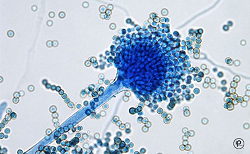Description:
Candida albicans is one of the fungal species most commonly causing life threatening infections in vulnerable patients. Our group is studying the mitochondria in Candida albicans cells.
Just like in our cells the mitochondria are the batteries of the cell, producing energy required for growth and in fungal cells can also influence infection.
The mitochondria can influence components of the fungal cell wall and its ability to infect us.
If we understand how mitochondria are influencing these factors, we can develop new anti-fungals or we can use existing anti-fungals in new combinations in order to tackle life threatening infections.
Lucian Duvenage works in Dr Campbell Gourlay’s lab at the University of Kent
Medical and Patient education videos
-
Title
Description
-

Prof. Neil Gow, University of Aberdeen, Fungal update 2015, 10th Anniversary
-

Dr. Elaine Bignell, University of Manchester, Fungal Update 2015, 10th Anniversary
-

Prof. Rob Miller, University College London, Funagl Update 2015, 10th Anniversary
-

Prof. Tom Harrison, St George’s University Hospitals, London, Fungal Update 2015, 10th Anniversary
-

Chair: Prof. Peter Donnelly
Proposers: Drs. Keith Wilson (BMT Unit, Cardiff) & Vanya Gant (Microbiology, UCLH, London)
Opposers: Drs. Brian Jones (Microbiology, Glasgow) & Stephen Ellis (Imaging, Barts, London)Debate – Fungal Update 2015, 10th Anniversary
-

Dr. Jonathan Lambourne, Hospital for Tropical Diseases, London, Fungal Update 2015, 10th Anniversary
Dr. Subathira Dakshina, Genito-Urinary Medicine & HIV, Bart’s Health NHS Trust, London, Fungal Update 2015, 10th Anniversary
-

Prof. Maiken Arendrup, Statens Serum Institut, Denmark, Funal Update 2015, 10th Anniversary
-

Prof Chris Kibbler, University College London, Fungal Update 2015, 10th Anniversary
-

Dr. Frank van de Veerdonk, Nijmegen, The Netherlands
